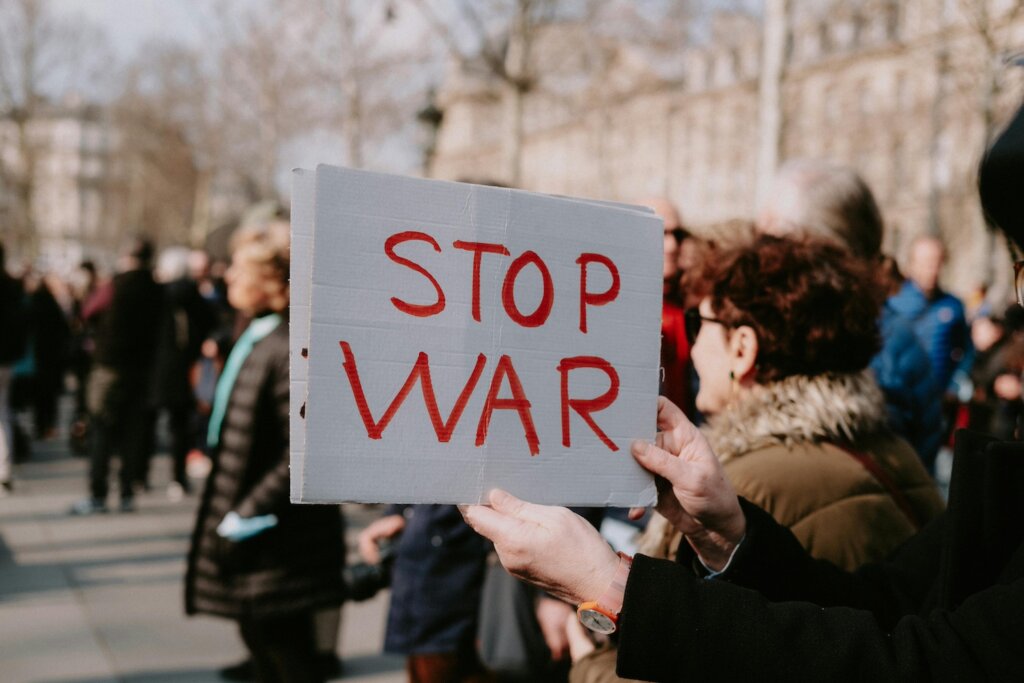Russia’s invasion of Ukraine has been a human tragedy, with countless lives lost, millions displaced, and widespread destruction. But as a new report reveals, the war has also taken a devastating toll on our climate. The recent report from the the Initiative on Greenhouse Gas Accounting of War (IGGAW) reveals that in just the first two years, the conflict generated a staggering 175 million tonnes of greenhouse gas emissions – more than the annual emissions of 175 countries combined and equivalent to the emissions produced by 90 million petrol cars in a year. The intertwined crises of war, climate change, and refugee displacement underscore a dire need for global compassion and concerted action.
The environmental toll of warfare
The recent report revealing the staggering climate impact of Russia’s invasion of Ukraine has shed light on an often overlooked dimension of war: its environmental cost. The emissions from the Russian invasion stem from various sources, including direct military activities, landscape fires, rerouted flights, forced migration, and damage to fossil fuel infrastructure. The deliberate targeting of energy infrastructure has caused massive leaks of potent greenhouse gasses. The destruction of the Nord Stream 2 pipelines alone released about 14 million tonnes of CO2 equivalent methane into the sea, significantly exacerbating the climate crisis.
The climate impact of Russia’s invasion extends far beyond the immediate emissions from warfare. As Ukraine begins the long process of rebuilding, the carbon cost will continue to mount. The report estimates that a staggering one-third of the total emissions will come from the manufacturing of steel, concrete and other materials needed to reconstruct damaged homes, schools, bridges and infrastructure. Some rebuilding has already begun, only for structures to be destroyed again by ongoing fighting. The scale of these “reconstruction emissions” will depend on whether Ukraine adopts traditional, carbon-intensive methods or embraces greener, more sustainable building practices. But one thing is clear: the environmental fallout from this war will be felt for generations to come.

The refugee crisis and its climate impact
The war has displaced nearly 7 million Ukrainians, forcing them to seek refuge in Europe and other parts of the world. The emissions related to this forced migration are substantial, contributing approximately 3.3 million tonnes of CO2 equivalent. The displacement of people not only highlights the immediate human suffering caused by conflict but also the longer-term environmental ramifications. As we reckon with the climate cost of this crisis, we must never lose sight of the individuals at its heart. Welcoming those seeking refuge is not just a humanitarian duty, but an environmental imperative.
The global military carbon footprint
The report by IGGAW emphasizes the need for better accounting of military emissions, which are historically underreported due to military secrecy and limited access for researchers. Militaries worldwide are responsible for about 5.5% of global greenhouse gas emissions annually, more than the aviation and shipping industries combined. This massive carbon footprint is often excluded from international climate action plans, skewing the true picture of global emissions.
The call for climate reparations
The groundbreaking report, released by the Initiative on Greenhouse Gas Accounting of War (IGGAW), has put a $32 billion price tag on the climate damage caused by Russia in just the first 24 months of the conflict. This figure is based on a comprehensive analysis of the war’s carbon footprint, taking into account emissions from military activity, infrastructure damage, landscape fires, and the displacement of millions of people.
The IGGAW argues that this $32 billion is a debt that Russia owes not only to Ukraine, but also to developing nations around the world that will bear the brunt of climate change impacts. Many of these countries have contributed little to the global emissions problem, yet they face the most severe consequences – from rising sea levels and more intense hurricanes to droughts and crop failures. By quantifying the climate costs of the war, the report makes a compelling case for holding Russia financially accountable for the environmental damage it has caused.
Compassion and responsibility
Understanding the interconnected nature of war, climate change, and refugee crises is crucial. Each conflict exacerbates the climate emergency, which in turn increases displacement and suffering. We cannot hope to address any of these challenges in isolation. Compassion is not just a moral imperative but a necessity for addressing these intertwined crises effectively.
Moving forward
- Enhanced military emissions reporting: There is an urgent need for international agreements on reporting military emissions. Transparency in this area can lead to more accurate global emissions data and better climate action plans.
- Sustainable reconstruction: The reconstruction of war-torn areas must prioritize sustainable building practices to minimize future carbon footprints. International support and funding should focus on green technologies and materials.
- Support for refugees: Compassionate policies are needed to support displaced populations. This includes not only immediate aid but also long-term integration strategies that consider environmental sustainability.
- Global cooperation: Addressing the climate impacts of war requires global cooperation. Countries must work together to hold accountable those responsible for environmental damage and to develop comprehensive strategies for mitigating the climate impacts of conflicts.
The findings from the IGGAW report underscore the urgent need for a holistic approach to conflict resolution, one that includes environmental considerations and compassionate responses to human displacement. By acknowledging and addressing the interconnected nature of war, climate change, and refugee crises, the global community can take meaningful steps towards a more sustainable and just future.
